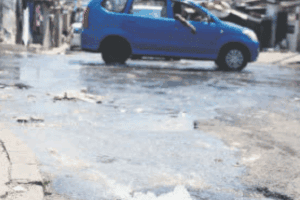Sewage samples taken from waste treatment plants can be used to work out the average viral load across a community and track if the viral load is increasing, decreasing or staying the same

A group of South African scientists working from a KwaZulu-Natal lab is using faecal matter to detect and track Covid-19 hotspots.
GreenHill Laboratories in Hilton, where SA’s first positive Covid-19 South African was disclosed, detected SARS-CoV-2 ribonucleic acid (RNA) in sewage early in June as part of a full-service virus risk forensic programme.
The lab says the development means South Africa has the capability for this kind of testing and samples do not have to be sent to other countries for testing.
It also means that statistically relevant sampling and timeous delivery to the laboratory are possible and that there is no need to develop specific kits.
The pilot entailed taking sewage samples from five wastewater treatment works in Gauteng and transporting them to GreenHill Laboratories in Hilton, KZN.
“The process involves taking bulk, composite samples through to a laboratory capable of meeting the needs of clients in both the public and private sectors,” scientist Dr Shaun Groenink said on Friday.
He said the undertaking came to fruition after the labs were approached by Professor Anthony Turton from the University of the Free State and Amanzi-4-All.
“They approached us [when] they were in discussion with the Dutch Water Research Institute about using an approach they had developed over there and implementing it in SA. As part of the protocol, they needed a lab to do the actual testing of the RNA. They approached us and then we said let’s try it, and presto, here we are.”
READ MORE: Sewage could be used to tell where Covid-19 hotspots are
How does it work?
Groenink said the process involved samples taken from the inlet of waste treatment works over a 24-hour period.
“This is done so you get a full representative and statistically relevant sample from that community that is being served by that treatment works. If you just take a grab sample, it depends on the time of day and how often people are using ablutions. So, you need to take a sample over 24 hours to get a proper representative sample.”
“That sample is then transported to us. When we receive it, we concentrate the viral particles, if there are any, and then we extract the viral RNA.”
Taking it a step further
He said the technique or method from their Dutch counterparts “was just a qualitative essay, so it will tell you if it is [the virus] there or not”.
“We have been able to develop that slightly further and be able to quantify so we are able to tell you how much viral RNA is in that sample.” Groenink said they were still refining this step.
“We still need to work on the math going forward, but we would obviously record the sub-sample we take here and then that can be extrapolated back to the sample when it was taken at the waste treatment works.”
He said some treatment works did not measure the flow rate.
“Unfortunately, a lot of our treatment works are not quite up to scratch so ideally, we would know the flow rate that going through that inlet throughout the 24 hours. Then based on that information, you can then work out how much you’ve sampled from the actual community.”
Where to from here?
Groenink said that many variables could then be worked out.
“Based on the population size of that community, then work out the average viral load across the community. But because we were able to quantify it relatively, so taking the same samples every week, you can track if the viral load is increasing, decreasing or staying the same in a particular community.”
He added that reports on their work were with the Department of Water and Sanitation.
“Amanzi-4-all presented the reports to the Department of Water and Sanitation and we were meant to meet with them a couple of times but for various reasons, those meetings were postponed. But yes, those reports are sitting with the Department of Water and Sanitation for nationwide implementation.”
For more news your way, download The Citizen’s app for iOS and Android.






